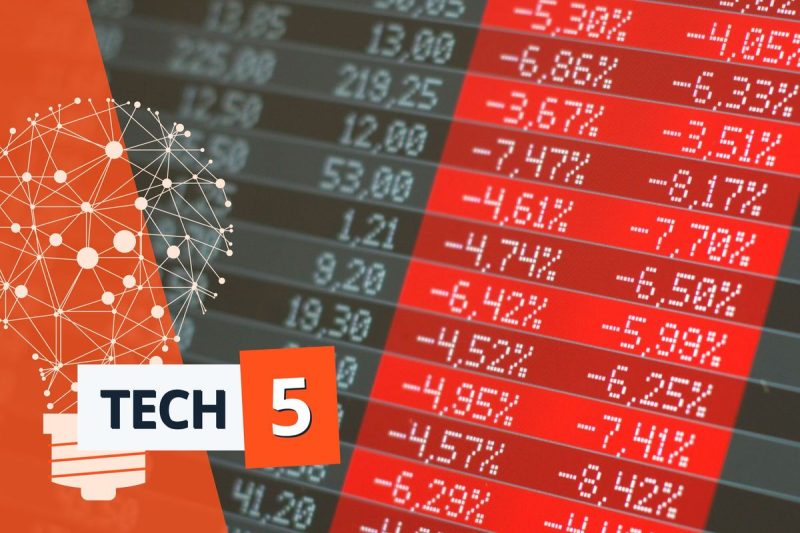Global markets took a beating this week as investors and world leaders reacted to sweeping tariffs announced by the Trump administration on April 2, with tensions between the US and China escalating.
After last week’s losses, this week started with a brief but sizable 8.5 percent surge on Monday (April 7), followed by a sharp decline that extended into Tuesday’s (April 8) trading day.
The move came after news outlets reported a potential 90 day pause on US President Donald Trump’s widespread tariffs. While the White House was quick to deny the rumour, Trump ultimately did opt to pause reciprocal tariffs for most nations amid a falling bond market and public opposition from within the Republican Party.
The pause brought a substantial 9.5 percent gain by the closing bell, but Thursday (April 10) saw another 6.3 percent fall as uncertainty continued to plague the market.
The president has now narrowed his focus to China, increasing the country’s tariff rate from 104 percent to 125 percent on Wednesday (April 9). On Thursday, the Trump administration confirmed that those levies would be added to the previous 20 percent tariff, bringing the total to 145 percent. China has responded in kind, levying 125 percent tariffs against all products coming from the US, up from its previous retaliatory figure of 84 percent.
All Magnificent 7 stocks, which were already down for the year, have fallen considerably since April 2; however, the Information’s Martin Peers notes that Apple (NASDAQ:APPL), a product maker with manufacturing ties and a large customer base in China, has experienced steeper declines than chip makers and software providers Google (NASDAQ:GOOGL), Broadcom (NASDAQ:AVGO), Meta Platforms (NASDAQ:META) and Amazon (NASDAQ:AMZN).
Peers also points out that Microsoft’s (NASDAQ:MSFT) diversified business model and less dramatic recent growth make it well positioned to handle market volatility.
While the current tariff regime has exemptions for semiconductors, other data center materials are exposed, as highlighted by Gil Luria, managing director and head of technology research at DA Davidson.
Luria told Fortune that at least one-quarter to one-third of data center costs are non-semiconductor components, casting a shadow of uncertainty over the trillion-dollar data centers planned over the next few years.
Adding to the volatility, an article published last week by global market intelligence company IDC suggests tariffs could lead to a notable slowdown in global IT spending in 2025.
With that, let’s dive into this week’s top stories.
1. NVIDIA CEO meets with Trump
The White House will reverse plans to put additional export restrictions on NVIDIA’s (NASDAQ:NVDA) cutting-edge H20 chips, according to NPR. Anonymous sources say CEO Jensen Huang spoke to the president at a dinner in Mar-a-Lago last week, committing to increase its investment in the US artificial intelligence (AI) data center buildout.
After the dinner, the administration opted to pause a months-long plan to place additional export restrictions on NVIDIA’s H20 chips, the most advanced chips US-based enterprises can sell to China under the current laws.
The plan had been in the works since lawmakers began lobbying the administration to limit China’s access to cutting-edge technology following the release of DeepSeek’s AI chatbot, R1.
“If NPR’s reporting is accurate, this news is a significant positive for NVIDIA, as well as a more modest tailwind for other portions of the server supply chain,” Wedbush Securities analyst Matt Bryson said in a client note on Thursday.
After the Trump administration’s tariff announcement last week, Reuters reported that Chinese companies, including Alibaba Group Holding (NYSE:BABA), ByteDance and Tencent Holdings (OTC Pink:TCE:HY,HKEX:0770), had placed roughly US$16 billion in orders for NVIDIA’s H20 chips.
2. Apple customers fear price increases
Customers filed into Apple stores across the US over the weekend, fretting that the iPhone maker may be forced to raise prices on its products in the face of rising manufacturing costs stemming from the ongoing US-China trade war.
The tech giant is heavily reliant on Asian assembly lines, and experts widely agree that a return of tech manufacturing to the US is a complex and time-consuming process, making it an unlikely immediate solution for a company whose products are high in demand and require rapid production and distribution. The company is planning a series of new product releases for 2025, with the release of the iPhone 17 slated for September.
In the short term, Apple appears to be turning to India as an alternative to mitigate the impact of the tariffs. The company reportedly loaded flights from India with iPhones before the tariffs went into effect, allegedly lobbying Chennai International Airport authorities to cut down customs from 30 hours to six hours to speed up the airlift.
So far, Apple hasn’t made any official announcements on potential price adjustments.
The company managed to secure an exemption when Trump imposed tariffs in his first presidential term, but it’s unclear if the president will be swayed to grant a waiver again.
3. Pichai reaffirms Google’s AI strategy
Amid stock market turbulence and a downturn in the tech sector, Google CEO Sundar Pichai reiterated the company’s commitment to substantial investment in developing its AI infrastructure and product line, reaffirming its plans to allocate a significant budget of US$75 billion towards capital expenditures.
The update came as the company convened at its Cloud Next conference, held this week in Las Vegas, Nevada. During the event, Google unveiled a suite of new AI services.
Among the many developments shared with attendees, Google Cloud and Samsung (KRX:005935) announced a strengthened partnership aimed at integrating Google Cloud’s advanced generative AI technology into Samsung’s Ballie, an innovative home AI companion robot slated to hit US and South Korean markets this summer.
This collaboration signifies the growing convergence of AI capabilities and home robotics, paving the way for a new era of intelligent and interactive home companions.
Samsung hasn’t announced pricing for Ballie, but tariffs could inflate costs. The 90 day pause and productive trade talks with South Korea, where Samsung has manufacturing locations, offer a glimmer of hope for consumers.
4. New autonomous driving and EV entrants
The landscape of electric vehicles (EVs) continues to evolve despite a shifting political backdrop.
This week saw reports that Zoox, Amazon’s robotaxi subsidiary, has begun testing its autonomous taxi services in Los Angeles, signaling the company’s confidence in its self-driving technology.
Meanwhile, TechCrunch reported that Slate Auto, a Michigan-based EV start-up with ties to Amazon, is going ahead with plans to begin production of an entry-level US$25,000 electric pickup truck as soon as next year.
The company has reportedly raised at least US$111 million and hired hundreds of employees from Ford (NASDAQ:FORD), General Motors (NYSE:GM), Stellantis (NYSE:STLA) and Harley-Davidson (NYSE:HOG).
According to the report, the company plans to supplement the truck’s small margins by selling aftermarket vehicle accessories and apparel. Slate hopes to begin production in Indiana by late 2026.
Adding to an influx of new EV players, Taiwanese manufacturing company Foxconn Technology (TPE:2354) announced its intention to bring two new battery EVs to the US market, with one slated to hit the markets in late 2025.
In the realm of driverless technology, Nissan Motor (TSE:7201) said Thursday that it will integrate self-driving technology developed by the UK’s Wayve in its ProPilot assisted driving feature starting next year.
These developments follow a Washington Post report earlier this week that found Americans’ interest in EVs is waning in the face of the Trump administration’s effort to pull back spending on EV infrastructure, including canceling a Biden-era initiative to build EV charging stations across the country and potentially repealing EV tax credits.
5. OpenAI considers hardware acquisition, counter-sues Musk
A Monday report from the Information suggests that OpenAI is in talks to acquire io Products, a hardware startup co-founded by the company’s CEO, Sam Altman, and former Apple design chief, Jony Ive.
According to the report, the startup has been collaborating with Ive’s design studio, LoveFrom, on the development of a new hardware device that would act as an interface between users and voice-enabled AI assistants.
While the two companies are reportedly exploring partnerships that don’t involve an acquisition, the potential deal could value io Products at up to US$500 million, according to the report.
In other developments, OpenAI countersued Tesla (NASDAQ:TSLA) CEO Elon Musk on Wednesday, citing ongoing harassment since the startup began transitioning toward a for-profit structure in 2023.
“Through press attacks, malicious campaigns broadcast to Musk’s more than 200 million followers on the social media platform he controls, a pretextual demand for corporate records, harassing legal claims, and a sham bid for OpenAI’s assets, Musk has tried every tool available to harm OpenAI,” the company wrote in a court filing.
Securities Disclosure: I, Meagen Seatter, hold no direct investment interest in any company mentioned in this article.

